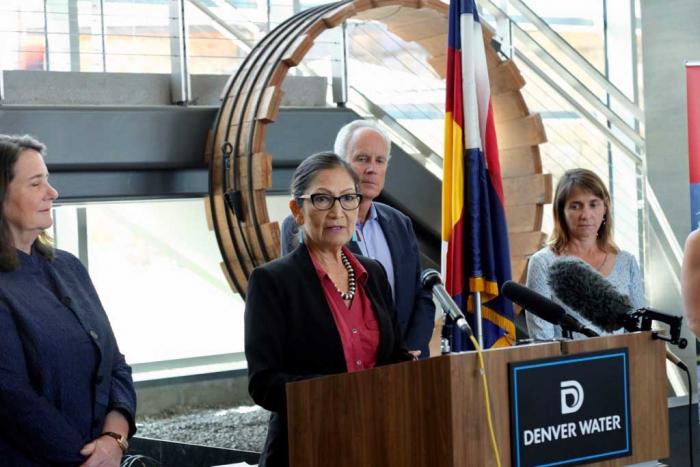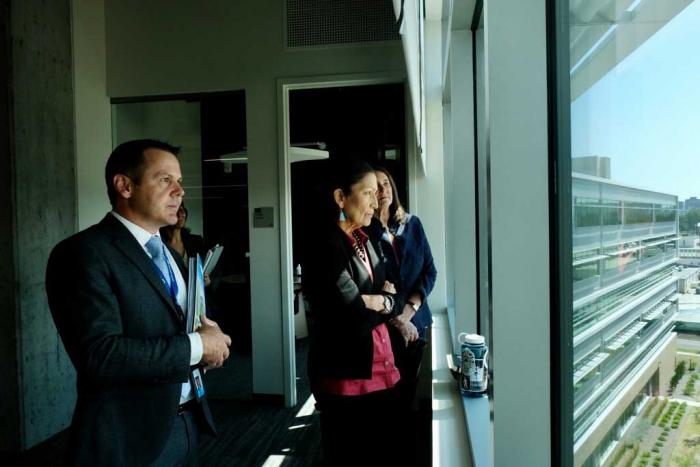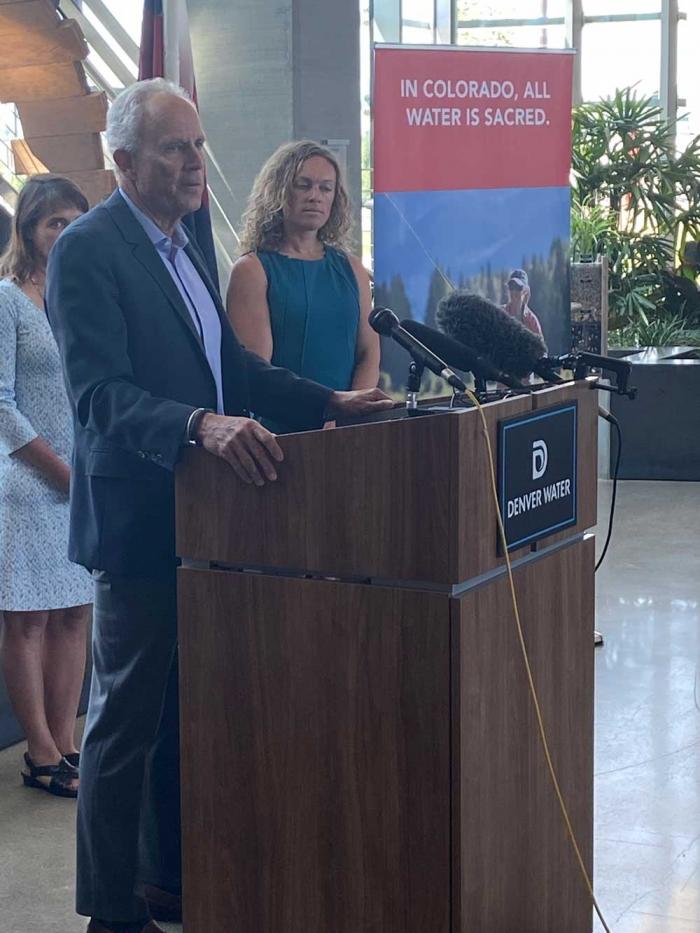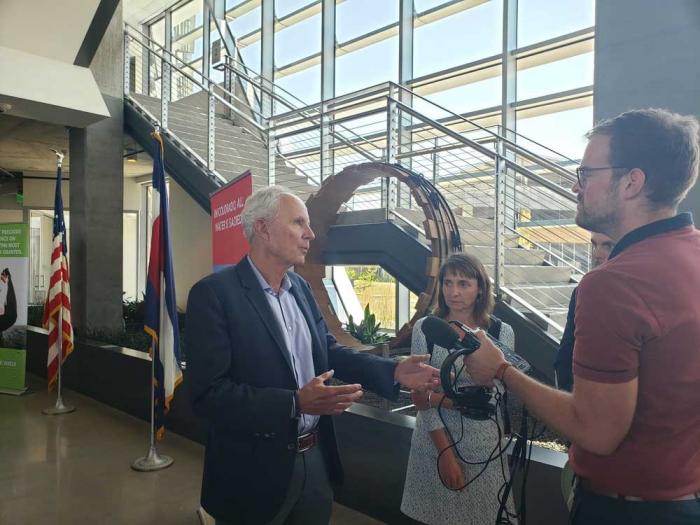Interior Secretary Deb Haaland meets with Colorado water leaders
Tackling the challenges surrounding climate change and water supply will require collaboration and creative thinking, Colorado’s top water leaders and senior federal officials agreed Thursday.
More than a dozen state officials and water leaders from across the state met at Denver Water’s Operations Complex with Department of the Interior Secretary Deb Haaland to discuss the impacts of climate change, the ongoing drought across the Colorado River Basin and how leadership and collaboration at every level will be needed to help address it.
After the discussion, Jim Lochhead, Denver Water’s CEO/Manager, welcomed the group — which included Interior's Assistant Secretary for Water and Science Tanya Trujillo, Colorado Congresswoman Diana DeGette, Rebecca Mitchell, director of the Colorado Water Conservation Board, and Colorado Commissioner of Agriculture Kate Greenberg — to a news conference at the utility’s Administration Building, completed in 2019, that is itself a demonstration of the future of water and water efficiency in an urban setting.
“What you see here today is the most advanced and sustainable building that’s yet been developed in Colorado,” Lochhead said.
“It includes rainwater capture for irrigation purposes — which we had to obtain a water right in order to do — and it includes an in-building waste water treatment system that treats the wastewater from this building and reuses it for irrigation and toilet flushing,” Lochhead said, adding that the utility hopes to work with nearby communities and the City and County of Denver to incorporate the building’s new technologies and efficiencies throughout the metro area.
Lochhead said the roundtable also included a discussion of the investments Denver Water is making in watershed health, through its From Forests to Faucets program that includes partners at the state and federal level, water conservation, resiliency and sustainability.
“The infrastructure that supplies our system isn’t just the reservoirs and the treatment plants — it’s the watersheds, forests, rivers and streams. And if those aren’t healthy and vibrant and sustainable, then we can’t meet our mission of supplying the 1.5 million people who live within our service area,” he said.
Haaland said she was glad to tour “this beautiful building” and praised the roundtable for bringing a wide range of people together for a thoughtful and important discussion.
“We have to work together, that’s the bottom line,” she said. “Drought doesn’t impact just one community, it impacts all of us — from farmers and ranchers to city dwellers and Indian tribes — we all have a role to use our water wisely, manage our resources with every community in mind, work collaboratively and respect each other during this challenging time.”
Haaland said the Interior Department is co-chairing an interagency working group to address the worsening drought-related conditions in the West and working to get financial and technical assistance for impacted irrigators and Indian tribes.
“We’re also developing longer-term measures to respond to climate change, including building more resilient communities and protecting the natural environment,” Haaland said.
The efforts are part of a larger push by President Joe Biden’s administration around jobs and infrastructure, including investing in water efficiency and recycling programs, tribal water settlements and dam safety, she said.
“Every community across the West has my commitment and the commitment of the Department of Interior that we will do everything to protect and manage our precious water resources not only in times of drought but every single day,” Haaland said.
Tanya Trujillo, the Interior Department’s assistant secretary for science and water, said part of the morning’s discussion revolved around what communities and water districts directly affected by climate change and drought are experiencing.
“Climate change is real and we’re seeing it throughout the West,” Trujillo said, adding that in addition to drought, communities are seeing flooding and landslides that can be traced back to a changing climate.
“We’re working as a team within Interior and with partner agencies across the federal level, taking a leadership role in looking at longer-term programs,” she said.
DeGette, noting that more than one-third of Colorado is experiencing severe drought conditions, said the “great collaboration” that exists between local, state and federal officials will be critical in tackling drought as well as climate change issues.
“We’re in a desperate situation in many places in the West and it’s going to take this collaboration that we’ve had for a long time between our state, local and federal partners to get something done,” she said.
Greenberg said it meant a lot to the people working across Colorado’s agriculture sector to know issues surrounding climate change were “top of mind” at both the state and federal level.
“It’s important to make sure that agriculture is supported and remains foundational to our state and that we are bringing tools here to Colorado, to our producers, to help them meet the challenges ahead,” Greenberg said.
Mitchell noted that the climate change and drought conditions are not limited to Colorado but affect the entire Colorado River Basin.
“The only way we’ll find success for the future of water is if we do it in a collaborative sense, and it’s so important that the highest levels of the administration have come here to discuss that,” Mitchell said.
“We appreciate that and thank you so much. I’m confident that we’ll be able to work together for all.”
Attendees at the water leaders’ roundtable discussion were:
- Deb Haaland, Secretary of the U.S. Department of the Interior.
- Tanya Trujillo, Assistant Secretary for Water and Science, U.S. Department of Interior.
- Davis Raff, Chief Engineer, U.S. Bureau of Reclamation.
- Carly Jerla, Senior Water Resources Program Manager, U.S. Bureau of Reclamation.
- Diana DeGette, U.S. Representative for Colorado's First Congressional District.
- Colorado Gov. Jared Polis.
- Colorado Lt. Governor Dianne Primavera.
- Kate Greenberg, Colorado Commissioner of Agriculture.
- Dan Gibbs, Executive Director, Colorado Department of Natural Resources.
- Rebecca Mitchell, Director, Colorado Water Conservation Board.
- Jim Lochhead, CEO/Manager, Denver Water.
- Christine Arbogast, representing Colorado Water Congress.
- Peter Fleming, General Counsel, Colorado River Water District.
- Jim Broderick, Executive Director, Southeastern Colorado Water Conservation District.
- Ken Curtis, General Manager, Dolores Water District Manager (retired).
- Steve Wolff, General Manager, Southwest Water Conservation District.
- Jennifer Pitt, Colorado River Program Director, National Audubon Society.
Jim Lochhead, CEO/Manager of Denver Water, talks to water reporter Luke Runyon from KUNC after a news conference on issues surrounding drought in the Colorado River Basin. Photo credit: Denver Water.





